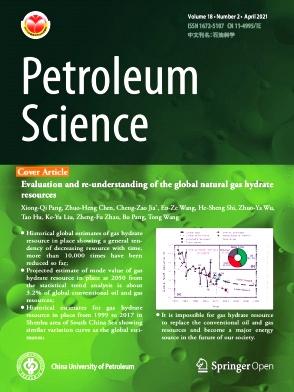Morphological complexity and azimuthal disorder of evolving pore space in low-maturity oil shale during in-situ thermal upgrading and impacts on permeability
IF 6
1区 工程技术
Q2 ENERGY & FUELS
引用次数: 0
Abstract
In-situ thermal upgrading is used to tune the pore system in low-maturity oil shales. We introduce fractal dimension (D), form factor (ff) and stochastic entropy (H) to quantify the heating-induced evolution of pore morphological complexity and azimuthal disorder and develop a model to estimate the impact on seepage capacity via permeability. Experiments are conducted under recreated in-situ temperatures and consider anisotropic properties—both parallel and perpendicular to bedding. Results indicate that azimuthal distribution of pores in the bedding-parallel direction are dispersed, while those in the bedding-perpendicular direction are concentrated. D values indicate that higher temperatures reduce the uniformity of the pore size distribution (PSD) in the bedding-parallel direction but narrow the PSD in the bedding-perpendicular direction. The greater ff (> 0.7) values in the bedding-parallel direction account for a large proportion, while the dominated in the bedding-perpendicular direction locates within 0.2–0.7, for all temperatures. The H value of the bedding-parallel sample remains stable at ∼0.925 during heating, but gradually increases from 0.808 at 25 °C to 0.879 at 500 °C for the bedding-perpendicular sample. Congruent with a mechanistic model, the permeability at 500 °C is elevated ∼1.83 times (bedding-parallel) and ∼6.08 times (bedding-perpendicular) relative to that at 25 °C—confirming the effectiveness of thermal treatment in potentially enhancing production from low-maturity oil shales.
低成熟度油页岩在原位热升级过程中不断演化的孔隙空间的形态复杂性和方位无序性及其对渗透率的影响
原位热升级用于调整低成熟度油页岩中的孔隙系统。我们引入了分形维度(D)、形态因子(ff)和随机熵(H)来量化加热引起的孔隙形态复杂性和方位无序性的演变,并建立了一个模型来估算渗透率对渗流能力的影响。实验是在重现的原位温度下进行的,并考虑了各向异性的特性--平行于和垂直于地层。结果表明,孔隙在与基底平行方向的方位角分布是分散的,而在与基底垂直方向的方位角分布是集中的。D 值表明,温度升高会降低孔隙尺寸分布在与基底平行方向上的均匀性,但会缩小孔隙尺寸分布在与基底垂直方向上的均匀性。在所有温度下,ff(> 0.7)值在与基底平行方向上占很大比例,而在与基底垂直方向上则主要集中在 0.2-0.7 范围内。在加热过程中,基底平行方向样品的 H 值稳定在 0.925 左右,而基底垂直方向样品的 H 值则从 25 °C 时的 0.808 逐渐升高到 500 °C 时的 0.879。与机理模型一致,500 °C时的渗透率比25 °C时分别提高了1.83倍(基底平行)和6.08倍(基底垂直)--这证实了热处理在提高低成熟度油页岩产量方面的潜在作用。
本文章由计算机程序翻译,如有差异,请以英文原文为准。
求助全文
约1分钟内获得全文
求助全文
来源期刊

Petroleum Science
地学-地球化学与地球物理
CiteScore
7.70
自引率
16.10%
发文量
311
审稿时长
63 days
期刊介绍:
Petroleum Science is the only English journal in China on petroleum science and technology that is intended for professionals engaged in petroleum science research and technical applications all over the world, as well as the managerial personnel of oil companies. It covers petroleum geology, petroleum geophysics, petroleum engineering, petrochemistry & chemical engineering, petroleum mechanics, and economic management. It aims to introduce the latest results in oil industry research in China, promote cooperation in petroleum science research between China and the rest of the world, and build a bridge for scientific communication between China and the world.
 求助内容:
求助内容: 应助结果提醒方式:
应助结果提醒方式:


